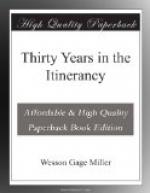Brother Wilcox was an able minister of the Lord Jesus Christ. He was a man of large intellect and strong convictions. His sermons embodied cardinal truth, and with him mere word painting was a sham. Sometimes he was thought to be severe, but it was the severity of what he conceived to be truth. In debate, on the Conference floor, or in discussion before an audience, he was a giant. At times he would seem to push his antagonist relentlessly, but it was only following his inexorable logic to its findings. The same thoroughness entered into all he did. On a committee it was his habit to go to the bottom of things. Especially was this true in the Conference examinations.
I remember distinctly the examination that was had the year I graduated to Elder’s orders. With him as chairman, and another strong man, whom I need not name, as second, we were under the fiery ordeal seven sessions. I have never ceased to wonder that anything was left of us, after having been thus ground between the upper and nether millstones. And yet there was no unkindness, for in his feelings he was as tender as a child. The fact is, this noble man could never do anything by halves. If the faithful discharge of duty, the persistent adherence to the right, and unsparing self-denial, constitute the standard of nobility, then Washington Wilcox. had a right to claim his patent.
At Waukesha, a respectable Church edifice had been erected in 1841 and 1842. At a later period a small Parsonage had been built, and on our arrival it was in readiness to receive us. The public services of the Sabbath were held at half-past ten in the morning and at one in the afternoon. The latter had been so arranged to accommodate families in the country, who desired a second service before returning home. The plan, however, did not fully satisfy the people in the village, as it failed to provide for an evening service. It was suggested that in a village, a certain class of people could be induced to attend an evening service that would not go to any other. To test the matter, I opened an evening service. The arrangement proved satisfactory, and was continued, though it involved the necessity of having three services a day.
The good seed of the kingdom, scattered among the crowds who gathered at the evening service, in due time began to bear fruit, and an extensive revival followed. As the good work in the village increased, and the number of converts was multiplied, the people of the surrounding neighborhoods became also interested, and attended the meeting. Many of these were induced to accept the obligations of a holy life, and as a result, invitations began to multiply, requesting me to open appointments in their respective localities. I now selected five of the most central neighborhoods and established in them week-day evening services. But as the summer drew on, they were discontinued except two, and these, as the most promising, were assigned to the Sabbath, and were filled on alternate days at four o’clock in the afternoon. To meet these appointments, in addition to the regular services in the village, required four sermons each Sabbath. As to the propriety of undertaking this amount of labor, I need say nothing. Some may deem it an evidence of zeal, but others that of folly.




